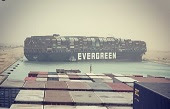The Iranian Foreign Ministry said assessing ways to strengthen strategic partnership and sharing views about regional and international issues will feature high in the talks.
The Ministry also said the two-day visit of Wang is a “step toward strengthening comprehensive strategic partnership between the two countries.”
Prospects of long-term cooperation and the ways to implement comprehensive strategic partnership will be the main topic of talks between Zarif and Wang, the ministry added.
Concurrent with the 50th anniversary of diplomatic relationship between Tehran and Beijing, the two chief diplomats will also inaugurate an exhibition on historical documents about cooperation between the two countries on Saturday.
The two foreign ministers also plan to sign a comprehensive cooperation document between Islamic Republic of Iran and People’s Republic of China.
Wang is the highest-ranking Chinese diplomat to pay an official visit to Iran since Chinese President Xi Jinping's visit in 2016, Hua Liming, a former Chinese ambassador to Iran, told the Global Times on Friday.
Hua also called Iran a key country on the Belt and Road Initiative (BRI) and one of the major oil exporters to China.
The nuclear issue will also be a key topic during the visit, according to Hua.
"The withdrawal of the Trump administration from the Joint Comprehensive Plan of Action (JCPOA) is a big blow to Iran's economy. In fact, Iran wants the United States to return to the deal, and China can coordinate with it," the former ambassador said.
The visit Chinese Foreign Minister has been scheduled days after top diplomats from China and the United States agreed at high-level talks in Alaska that Iran was one of the issues on which they could work together, despite their many differences, including on human rights in Xinjiang.
Security and stability in West Asia
In an interview with Al Arabiya on Wednesday, Wang proposed five initiatives to achieve security and stability in West Asia, noting that getting rid of geopolitical competition among great powers is the fundamental way to end the chaos.
As for the Iran nuclear issue, Wang pointed out that the US should take concrete measures to ease unilateral sanctions against Iran and its ‘long-arm jurisdiction’ over third parties, while Iran should resume fulfilling its nuclear commitments.
At the same time, Wang said, the international community should support the efforts of regional countries to establish a West Asia zone free of nuclear and other weapons of mass destruction.
All parties should discuss and formulate a route and timetable for the resumption of implementation of the JCPOA in accordance with the merits of the development of the Iran nuclear issue, Wang said, according to the Global Times.
China and Russia say US should return to JCPOA
unconditionally
In the meeting between Wang and Russian Foreign Minister Sergey Lavrov on Monday, the two senior diplomats said the United States should unconditionally return to the JCPOA as soon as possible and revoke the unilateral sanctions imposed against Iran.
Only China can act as a ‘peace-broker’ in the Iran nuclear issue, said Li Haidong, a professor of international relations at China Foreign Affairs University, "especially after China has exchanged ideas with the US in Alaska, then with Russia and then with Iran… and no other major international issue can be separated from China's participation and coordination."
Foreign Minister Wang started his tour of West Asia on Wednesday. He first visited Saudi Arabia and then Turkey. After concluding visit to Iran, he will fly to the United Arab Emirates and Bahrain, and make a working visit to Oman.
South China Morning Post said the 2015 Iran nuclear deal and alliances will be high on agenda of Wang’s visit to West Asia.







